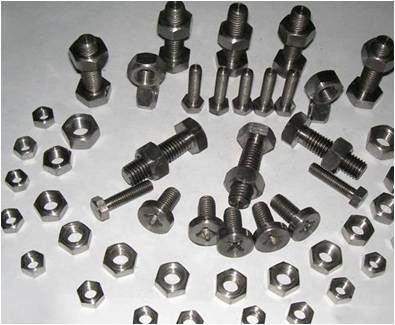What titanium fasteners have joined together,
let none put asunder.
Titanium fasteners’ obviously attractive property of low density and high strength make them an ideal candidate for fasteners, in both the internally and externally threaded options.
However, it is the elastic modulus that really makes the difference for the discerning engineer when choosing the material for his fasteners. The use of nuts with lower modulus than the male fastener is known to reduce the stress concentration effect at the first thread, and improves the distribution of load over the length of the engaged threads. Where high-modulus materials are specified for both internal and external threads, one way to achieve the same effect is to use combinations of male and female parts with very slightly differing thread pitches. Ideally, what is specifically sought in a fastener material is for it to be strong and to have low stiffness. Titanium scores well in that specific area with the added lightness as a convenient plus, not that this should be surprising for anyone with a minimum grasp on titanium properties.

It seems that there are few, if any, metals more auspicious than titanium to be molded in fasteners. At least, in theory. Practice, as always, is usually a somewhat different matter. The problems that usually arise are not related to the material itself, but rather to the actual installation procedures and the materials of the component that are adjoined by the use of titanium fasteners.
As for the installation procedures the primary issue that needs addressing is the well known galling tendency of the titanium. After all, fasteners were invented for those applications that needed strong joining and the possibility of rapid dismantling, possibly several times during the life of the product. This possibility is severely reduced because of galling. It is exactly because of this that the current F1 engine regulations prohibit the use of titanium fasteners. This restriction it is not carried for the use of chassis components.
Besides galling, another major issue with titanium that should be given serious consideration is the possibility of galvanic corrosion. Given the fact that fasteners most common use would be high-end application that emphasize weight reduction, chances are that the most common components that would be joined by titanium is aluminum. And there is a strong solution potential between these two particulars metals which promotes corrosion.
To prevent these problems, the use of special grease is strongly recommended during the installation of titanium fasteners. If possible, it is advised to use special fasteners designed and manufactured with additional protective coating.
Also, and especially if aluminum components are involved in the application, special care to address the galvanic corrosion must be employed. Prior to the installation it is recommended that both the fasteners and the components to be joined be treaded with an alkaline cleaning solution and, if possible, deoxidized (nitric acid being the most common choice).
A protective coating of the components must also be taken in consideration, mainly to prevent chemical conversion and also a standard non-corrosion zinc primer. Extreme care must be taken so that these coatings should not be broken during the installation. The fasteners must also be dipped in zinc chromate primer and installed wet.
After the installation, titanium fasteners and adjacent areas must also be touched-up with zinc chromate primer. This would especially include any bare areas that may occur during installation.
It seems like a great deal of work for such a small thing, such a little thing. Well, in 2008 Boeing discovered some 350000 fasteners that had been "incorrectly installed and do not conform to specifications" on the then-new Dreamliner 787, which led to some month delay of the maiden flight. More than often, the small things are a lot more than what they seem.
Return from titanium fasteners to titanium products
Return to Titanium Exposed Home








New! Comments
Have your say about what you just read! Leave me a comment in the box below.